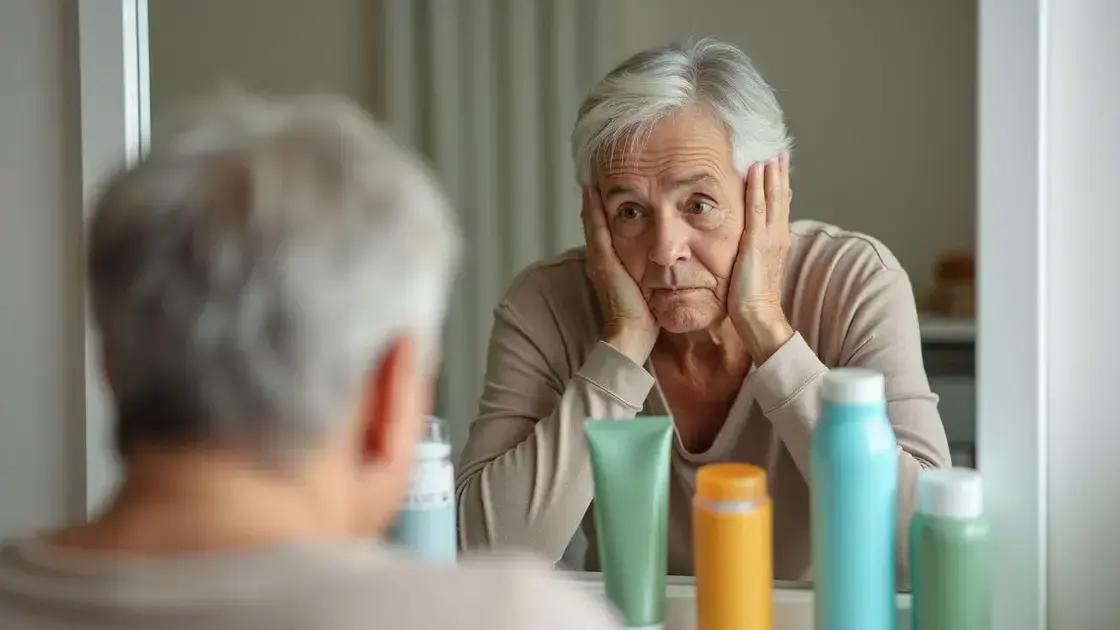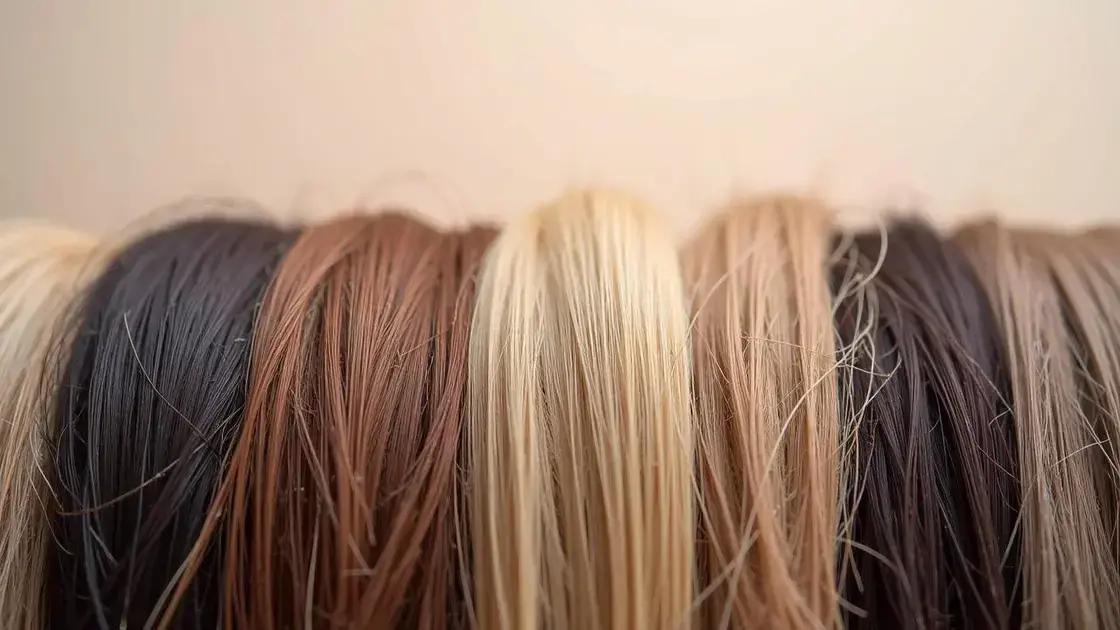Addressing hair thinning and loss after 50 involves understanding its common causes such as hormonal changes and genetics, exploring effective treatments like minoxidil and finasteride, and maintaining healthy hair through a balanced diet, hydration, and stress management.
Dealing with hair thinning and loss after 50 can feel overwhelming. Many individuals face changes in their hair density and texture as they age. Understanding the common causes behind this phenomenon is crucial for finding effective treatments and solutions. In this blog post, we’ll explore various strategies to address hair thinning, helping to restore not only your hair but also your confidence and vitality. Join us as we delve into understanding hair loss after 50 and uncover practical steps you can take for a healthier mane.
Understanding Hair Thinning After 50

Hair thinning after 50 is a common concern for many individuals. As we age, our bodies undergo various changes, including hormonal shifts and genetic factors, which can impact hair health. Understanding these changes can help you take informed steps to manage hair thinning effectively.
What is Hair Thinning?
Hair thinning refers to the gradual loss of hair density. It can affect both men and women, often resulting in more scalp visibility. Unlike complete hair loss, thinning often means that the hair is still present but not as full or thick. This condition is often noticeable around the crown and temples.
How Aging Affects Hair Growth
As we age, the hair growth cycle changes. The anagen phase, which is the active growth phase, becomes shorter, and the telogen phase, or the resting phase, becomes longer. This leads to a higher number of hairs falling out compared to those being regrown. Additionally, hair follicles may shrink, causing thinner strands of hair to grow.
The Role of Hormones
Hormonal changes, particularly during menopause for women, can significantly affect hair thinning. Decreased levels of estrogen can lead to thinner hair. Similarly, men may experience an increase in dihydrotestosterone (DHT), a byproduct of testosterone that can shrink hair follicles. This hormonal impact is a crucial factor in understanding hair thinning after 50.
Genetic Factors
Genetics also play a vital role in hair thinning. If you have a family history of hair loss, you may be more susceptible to experiencing similar issues as you age. The genetic predisposition can influence not only the timing of hair loss but also its severity.
Psychological Impact
Experiencing hair thinning or loss can affect self-esteem and confidence. Many individuals find that changes in their hair can lead to feelings of insecurity. Understanding and acknowledging these feelings is essential in addressing the psychological impact that hair thinning may cause.
Common Causes of Hair Loss

Hair loss can stem from several common causes, especially for individuals over 50. Understanding these factors can help in finding suitable solutions and treatments. Here are some of the most prominent causes of hair loss:
Genetic Factors
Genetics play a significant role in hair loss. Conditions like androgenetic alopecia, also known as male or female pattern baldness, can be inherited. If family members have experienced hair loss, there’s a higher chance you may too, especially as you age.
Hormonal Changes
As we grow older, hormonal changes can drastically affect hair growth. For women, menopause causes a decrease in estrogen, which can lead to hair thinning. Men may see increased levels of dihydrotestosterone (DHT), a hormone linked to hair loss. These changes can disrupt the natural growth cycle of hair.
Nutritional Deficiencies
Another crucial factor is nutrition. A lack of essential vitamins and minerals, such as vitamin D, iron, and protein, can contribute to hair loss. A balanced diet is important, as nutrients feed hair follicles and support healthy growth.
Medical Conditions
Certain medical conditions can also lead to hair loss. Diseases like thyroid disorders, alopecia areata, and autoimmune diseases can disrupt hair growth patterns. If you notice sudden hair loss, it’s advisable to consult a healthcare professional to rule out underlying conditions.
Stress and Lifestyle Factors
Emotional and physical stress can trigger hair loss as well. Experiences such as significant life changes, trauma, or illness may lead to telogen effluvium, a temporary form of hair loss. Additionally, lifestyle factors like smoking and excessive alcohol consumption can harm hair health.
Effective Treatments for Hair Loss

Finding effective treatments for hair loss can be a game changer for individuals experiencing thinning hair, especially after 50. Here are some of the most well-known and reliable options:
Over-the-Counter Treatments
Products like minoxidil, available without a prescription, are widely used to treat hair loss. Minoxidil can help stimulate hair growth and is often effective for both men and women. It’s applied directly to the scalp and is available in liquid or foam forms.
Prescription Medications
In some cases, doctors may prescribe medications. One common treatment is finasteride for men, which works by blocking the hormonal effects that can lead to hair loss. Consult with a healthcare professional to discuss the potential benefits and side effects.
Hair Restoration Procedures
For more severe cases of hair loss, surgical options are available. Hair transplantation involves moving hair follicles from one part of the scalp to another. This procedure can provide long-lasting results, but it’s essential to consult with a qualified surgeon.
Laser Therapy
Low-level laser therapy is a non-invasive treatment that uses laser devices to stimulate hair follicles. This therapy is often combined with other treatments to improve overall results. It’s available in clinics and as at-home devices.
Natural Remedies
Some individuals find success with natural treatments. Ingredients like essential oils, such as rosemary and peppermint, have been known to support hair growth. Incorporating a healthy diet rich in vitamins and minerals is also crucial for maintaining hair health.
Scalp Treatments
Using products like scalp scrubs and serums can encourage a healthy scalp environment. Maintaining a clean and well-nourished scalp may enhance hair growth and overall scalp health.
Maintaining Healthy Hair Post-50

Maintaining healthy hair after 50 requires special attention and care. Here are several key practices to help support hair health during this stage of life:
Balanced Diet
A balanced diet is critical for healthy hair. Include plenty of fruits, vegetables, whole grains, and lean proteins. Nutrients such as biotin, vitamin D, and iron are known to support hair health. Foods like salmon, nuts, and leafy greens can boost hair vitality.
Hydration
Staying hydrated is essential. Drinking enough water helps keep hair follicles moisturized and supports overall scalp health. Aim for at least eight glasses of water a day to promote optimal hydration.
Gentle Hair Care
Use gentle hair care products free from harsh chemicals. Look for shampoos and conditioners designed for aging hair. Additionally, avoid hot water when washing your hair, as it can strip hair of natural oils.
Regular Trims
Regular trims are important to remove split ends and maintain a healthy appearance. Getting a trim every six to eight weeks can help prevent further damage and keep hair looking fresh.
Protect from Heat and Sun
Limit the use of heat styling tools, as they can damage hair over time. When exposure to the sun is unavoidable, wear a hat or use products with UV protection to keep hair safe.
Scalp Care
Keep your scalp healthy by practicing good hygiene and occasionally using a scalp scrub. This can help remove build-up and promote better circulation, which can positively affect hair growth.
Stress Management
High levels of stress can affect hair health. Practice relaxation techniques such as yoga, meditation, or deep breathing to help manage stress levels.
In Summary: Embracing Healthy Hair in Your 50s and Beyond
Addressing hair thinning and loss after 50 involves understanding the underlying causes, exploring effective treatment options, and adopting practices that promote healthy hair.
From nutritional choices and hydration to gentle hair care and stress management, focusing on these elements can make a significant difference in the health of your hair. Regular trims and protecting your hair from heat and sun exposure are also crucial for maintaining its vitality.
By taking proactive steps and utilizing the right treatments, individuals can restore confidence and enjoy healthy, vibrant hair even as they age. Remember, it’s never too late to take control of your hair health.
FAQ – Common Questions About Addressing Hair Thinning and Loss After 50
What are the common causes of hair thinning after 50?
Common causes include genetic factors, hormonal changes, nutritional deficiencies, medical conditions, and stress. Understanding these factors can help address hair loss.
What effective treatments are available for hair loss?
Effective treatments include over-the-counter options like minoxidil, prescription medications like finasteride, hair restoration procedures, and natural remedies.
How can I maintain healthy hair post-50?
Maintaining healthy hair involves a balanced diet, staying hydrated, gentle hair care, regular trims, and managing stress.
Can natural remedies help with hair loss?
Yes, natural remedies such as essential oils, like rosemary and peppermint, can support hair health alongside a nutrient-rich diet.
Is it necessary to see a doctor for hair loss after 50?
If you’re experiencing sudden or severe hair loss, it is advisable to consult a healthcare professional to rule out underlying medical conditions.
How does stress contribute to hair loss?
High levels of stress can disrupt the hair growth cycle, leading to temporary hair loss known as telogen effluvium.













